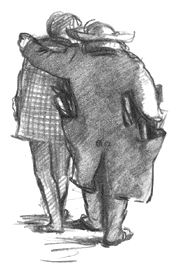Vie de Boheme – how the Bohemian Club was formed

17 of 24
The story so far … homeless artist and musician Alexandre Schaunard has been traipsing the streets of Paris, searching for anyone from whom he can borrow a few francs. He meets a philosopher, Gustave Colline, they share a meal and have just entered a café in search of alcohol and coffee. They meet two gentlemen, M. Mouton and M. Rodolphe, in the middle of an argument. Read on …
Rodolphe said “Proceed, then, proceed,”. “Well, then” – Mouton marked the rhythm of his phrases by knocking his fist on the table so that the mugs and glasses quivered – “well, then, I fall eagerly upon the newspapers, don’t I? And what do I find? One says white, the other says black, and round and round the mulberry bush … What does it all mean to me? I’m a decent father of a family, who comes here to – ”
“To play dominoes,” said Rodolphe. “Every evening,” agreed M. Mouton. “Well, just to illustrate my meaning, you understand …”
“All too well,” said Rodolphe.
“I read an article with which I don’t agree. It annoys me and I get all upset – because you see, monsieur Rodolphe, the newspapers are all lies. Yes, lies!” he proclaimed this in his shrillest falsetto. “The journalists are all swindlers, hired hacks.”
“All the same, M. Mouton …”
“Swindlers,” the Town Hall clerk continued. “They’re responsible for the revolution, and for the paper money. Take Murat, for example …”
“Excuse me, I think you mean Marat.”
“No, no, Murat – I know, because I saw his funeral when I was a little boy.”
“I assure you …”
“There was even a play at the Cirque about it.”
“Quite so,” said Rodolphe. “You mean Marat.”
“But what have I been telling you for the last hour? Murat, the man who worked in a cellar. Well, just to illustrate my meaning: weren’t the Bourbons right to guillotine him, for being a traitor?”
“Guillotine? A traitor? Who?” Rodolphe in his turn seized M. Mouton by a button of his frock-coat.
“Why, Marat!”
“No, no, monsieur Mouton, Murat. Let’s get this settled, for goodness’ sake!”
“Exactly: Marat, a rabble-rouser. He betrayed the Emperor in 1815. That’s why I say that all the newspapers are just the same.,” said M. Mouton, returning to his main theme for what he regarded as an explanation. “Do you know what I would like to see, monsieur Rodolphe? Well, just to illustrate my meaning … I’d like to see a good newspaper – oh, not a big one – a good one, that wouldn’t use any phrases … You see!”
“ That’s a tall order – a newspaper without any phrases!”
“Quite so. Now, following my reasoning …”
“I’m trying to.”
Vie de Bohème by Henry Mürger, a vivid portrait of the ‘Bohemian’ life of the artistic quarter of Paris in the nineteenth century was originally published (by Michel Lévy) in 1851. The extract above is taken from a translation by Norman Cameron, published by Hamish Hamilton. The illustration is by Dodi Masterman.
Leave a Response
You must be logged in to post a comment.

